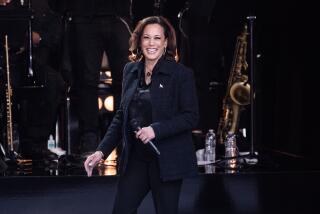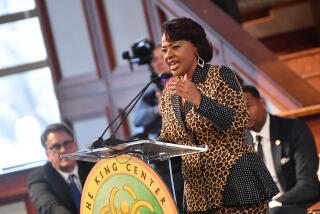Quayle Calls On Rights Group to Combat Illegal Drugs
- Share via
ATLANTA — Vice President Dan Quayle on Tuesday called illegal drugs “the modern equivalent of slavery” and urged a mostly black audience to combat narcotics as well as other social problems.
In addressing the opening of the Southern Christian Leadership Conference’s 32nd national convention, Quayle combined a spirited defense of the Bush Administration’s record on civil rights with exhortations to continue the struggle for equality.
Bush “has a great sensitivity to those without hope or opportunity,” Quayle told the crowd of 2,000. “He not only cares about them, he desperately wants to help them.”
Quayle’s appearance, following his speech to the National Assn. for the Advancement of Colored People in Detroit last month, is part of an effort by Republicans to reverse eight years of hostility between minorities and the Republican Administration of Ronald Reagan.
In his 30-minute address, which was greeted with polite applause, Quayle referred to black Bush appointees and to a litany of social ills--teen-age pregnancies, school dropouts, unemployment, poverty, crime, run-down housing, drugs--in an effort to connect with the SCLC delegates and guests.
But his speech demonstrated the difficulty that a white conservative Republican faces in making appeals to black people steeped in years of antagonism to the party’s policies.
Quayle’s reference to two black Bush appointees--Louis W. Sullivan, secretary of health and human services, and Gen. Colin Powell, newly named chairman of the Joint Chiefs of Staff--were well received. Powell attended the lunch and at one point received a standing ovation.
But, later, many delegates complained in interviews that Bush has lagged in appointing representative numbers of blacks to his Administration.
And, during Quayle’s speech, each mention of a black hero or of civil rights victories--which some felt had been achieved in the face of opposition from Republicans like Quayle--caused many eyes to roll and frowns to appear.
Quayle said, “I know that there are concerns among you about the growing number of incidents of racial and religious harassment and violence around the country. And I stand with you. There is no place for the klan, for neo-Nazis, for Skinheads or any other such hate group in our society.”
The vice president said that “family and values” would serve well in the war on social ills and that a “partnership between the government and the private organizations” is essential to victory.
Quayle thought his appearance went well. “I felt good about it,” he told a news conference after the speech. “I didn’t have any expectations going in there other than to deliver a very serious, important speech and message on behalf of President George Bush.”
But, afterwards, Monique Danielly, an education consultant from Atlanta, said, “I didn’t buy the talk. The Administration needs to put more money into” the fight against social ills.
Lurlene Jackson, a retired Atlanta factory worker, complained that Quayle’s talk was no more than “things that have been said over and over again.”
Louis Huley, a Milledgeville, Ga., hospital employee, said: “How can I believe what you say when I see what you do?”
That feeling, along with budget proposals that mirror Reagan’s cuts in social programs, caused Quayle’s effort to ring hollow, said Lorenzo Morris, a Howard University political science professor who specializes in black political trends.
More black political appointees would certainly help, Morris said. The war on drugs, for example, would have a better chance of attracting black enthusiasm if the drug czar were black, he said, noting: “William Bennett, last time I checked, was still white.”
The Rev. Joseph Lowery, president of the SCLC, defended the invitation to Quayle, saying blacks need to avoid being taken for granted by Democrats.
In introducing Quayle, Lowery said that the Administration must “put some music to the excellent words that have been spoken about civil rights. We have trouble dancing to just the words; we need some music.”
Powell’s appointment, he said to laughter and applause, was “a symphony.”
More to Read
Get the L.A. Times Politics newsletter
Deeply reported insights into legislation, politics and policy from Sacramento, Washington and beyond. In your inbox twice per week.
You may occasionally receive promotional content from the Los Angeles Times.










